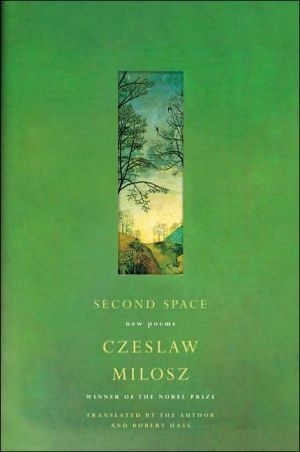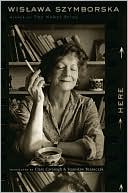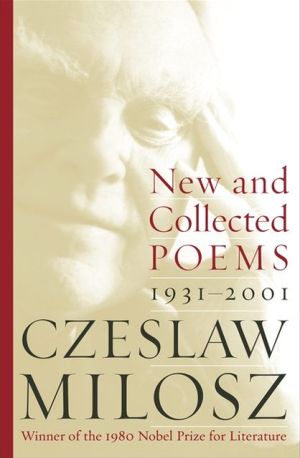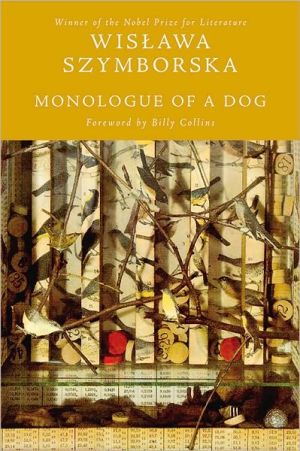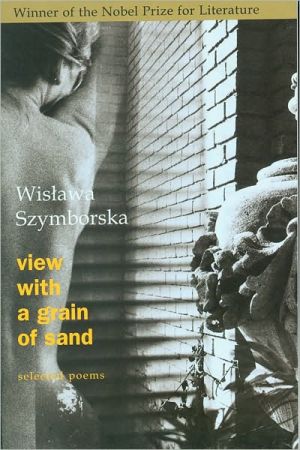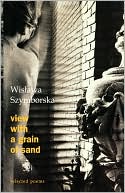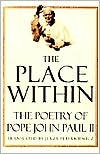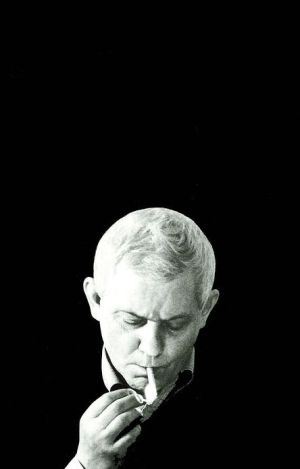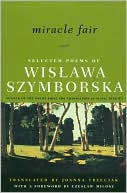Second Space: New Poems
Nobel laureate Czeslaw Milosz's most recent collection Second Space marks a new stage in one of the great poetic pilgrimages of our time. Few poets have inhabited the land of old age as long or energetically as Milosz, for whom this territory holds both openings and closings, affirmations as well as losses. "Not soon, as late as the approach of my ninetieth year, / I felt a door opening in me and I entered / the clarity of early morning," he writes in "Late Ripeness." Elsewhere he laments the...
Search in google:
Nobel laureate Czeslaw Milosz's most recent collection Second Space marks a new stage in one of the great poetic pilgrimages of our time. Few poets have inhabited the land of old age as long or energetically as Milosz, for whom this territory holds both openings and closings, affirmations as well as losses. "Not soon, as late as the approach of my ninetieth year, / I felt a door opening in me and I entered / the clarity of early morning," he writes in "Late Ripeness." Elsewhere he laments the loss of his voracious vision—"My wondrously quick eyes, you saw many things, / Lands and cities, islands and oceans"—only to discover a new light that defies the limits of physical sight: "Without eyes, my gaze is fixed on one bright point, / That grows large and takes me in." Second Space is typically capacious in the range of voices, forms, and subjects it embraces. It moves seamlessly from dramatic monologues to theological treatises, from philosophy and history to epigrams, elegies, and metaphysical meditations. It is unified by Milosz's ongoing quest to find the bond linking the things of this world with the order of a "second space," shaped not by necessity, but grace. Second Space invites us to accompany a self-proclaimed "apprentice" on this extraordinary quest. In "Treatise on Theology," Milosz calls himself "a one day's master." He is, of course, far more than this. Second Space reveals an artist peerless both in his capacity to confront the world's suffering and in his eagerness to embrace its joys: "Sun. And sky. And in the sky white clouds. / Only now everything cried to him: Eurydice! / How will I live without you, my consoling one! / But there was a fragrant scent of herbs, the low humming of bees, / And he fell asleep with his cheek on the sun-warmed earth."The New York Times - Meghan O'Rourke… the story Milosz is telling is our story, an American one as well as a European one, about broken faith and lost meanings in need of repair. His curiosity about intellectual questions -- and about the endurance of memory -- had that particular quality of persistence that is itself a branch of genius. There are certain human beings who have the capacity to ask the question ''Why?'' long after everyone else has tired of it (and, perhaps, its attending answer). ''Crooked'' they may be, like the rest of us -- and yet they set themselves apart by virtue of will. ''I should be dead already, but there is work to do,'' Milosz writes here, in the lovely, fragmented ''Notebook.'' Alas, his work is now in our hands. But our job -- reading it -- is among the most rewarding ones imaginable.
Second space3Late ripeness4If there is no God5In Krakow6Framing7Werki8Advantage9A master of my craft10A stay11On old women12Classmate13Tenant15Guardian angel17A beautiful stranger18To spite nature19I should now21High terraces22Nonadaptation23Hear me24Scientists25Merchants26Coffer27I28Degradation29New age30Eyes31Notebook32Many-tiered man34Father Severinus37Treatise on theology47Apprentice67Orpheus and Eurydice99
\ Cynthia HavenThose who have followed Milosz's trajectory will marvel that he came up with his own poetic brand of a happy ending, that his lifelong ambivalences finally resolve into the grace and gravitas of this book. \ — The Washington Post\ \ \ \ \ Meghan O'Rourke… the story Milosz is telling is our story, an American one as well as a European one, about broken faith and lost meanings in need of repair. His curiosity about intellectual questions -- and about the endurance of memory -- had that particular quality of persistence that is itself a branch of genius. There are certain human beings who have the capacity to ask the question ''Why?'' long after everyone else has tired of it (and, perhaps, its attending answer). ''Crooked'' they may be, like the rest of us -- and yet they set themselves apart by virtue of will. ''I should be dead already, but there is work to do,'' Milosz writes here, in the lovely, fragmented ''Notebook.'' Alas, his work is now in our hands. But our job -- reading it -- is among the most rewarding ones imaginable.\ — The New York Times\ \ \ Publishers WeeklyThe title's second space comprises heaven and hell, which have "vanished forever"; without them the blessed cannot "meet salvation" and the damned "find suitable quarters." In mourning, the poet exhorts: "Let us implore that it be returned to us,/ That second space." The Nobel laureate, who died this past summer in Krak w at 93, is preoccupied in this collection with establishing that space through words, but also finds it in carnality and in "the unattainable Now." The opening section of summative short lyrics on themes familiar from late Milosz (memory, salvation, place) is followed by four long poems. "Father Severinus" is an eponymous 11-poem dramatic monologue of a priest (who shares one of the names of medieval philosopher Boethius) in whom there is "only a hope of hope." Next comes "Treatise on Theology" ("A young man couldn't write a treatise like this,/ Though I don't think it is dictated by fear of death"), followed by "Apprentice," a beautiful autobiography in verse (with extensive prose annotations by Milosz) and finally a stunning, short "Orpheus and Eurydice": "His lyre was silent and in his dream he was defenseless./ He knew he must have faith and he could not have faith./ And so he would persist, for a very long time,/ Counting his steps in a half-wakeful torpor." The terrors, torpors and partial redemptions of this collection feel wholly earned. (Oct.) Copyright 2004 Reed Business Information.\ \ \ \ \ Library JournalEarly essays and final poems from the late, great Nobel prize winner. Copyright 2005 Reed Business Information.\ \
